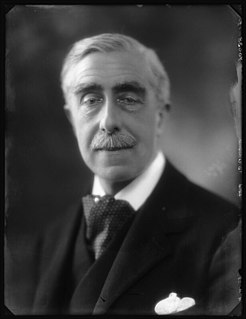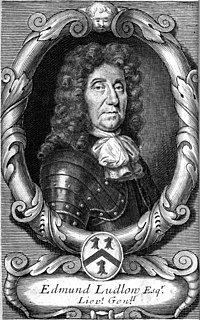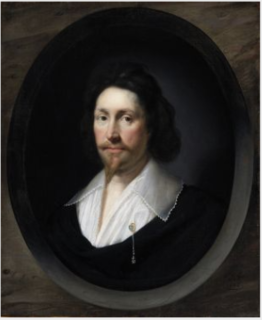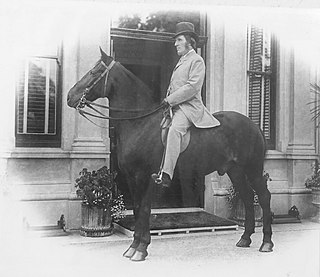Related Research Articles

The Long Parliament was an English Parliament which lasted from 1640 until 1660. It followed the fiasco of the Short Parliament, which had convened for only three weeks during the spring of 1640 after an 11-year parliamentary absence. In September 1640, King Charles I issued writs summoning a parliament to convene on 3 November 1640. He intended it to pass financial bills, a step made necessary by the costs of the Bishops' Wars in Scotland. The Long Parliament received its name from the fact that, by Act of Parliament, it stipulated it could be dissolved only with agreement of the members; and those members did not agree to its dissolution until 16 March 1660, after the English Civil War and near the close of the Interregnum.

The Rump Parliament was the English Parliament after Colonel Thomas Pride purged the Long Parliament, on 6 December 1648, of those members hostile to the Grandees' intention to try King Charles I for high treason.

Earl of Powis (Powys) is a title that has been created three times. The first creation came in the Peerage of England in 1674 in favour of William Herbert, 3rd Baron Powis, a descendant of William Herbert, 1st Earl of Pembroke. In 1687, he was further honoured when he was made Marquess of Powis.

The Rout of Ludford Bridge was a largely bloodless confrontation fought in the early years of the Wars of the Roses. It took place on 12 October 1459, and resulted in a setback for the Yorkists. Although this seemed to be a triumph for the rival Lancastrians at the time, they had thrown away their advantage within six months.

Charles Bathurst, 1st Viscount Bledisloe, was a British Conservative politician and colonial governor. He was Governor-General of New Zealand from 1930 to 1935.

Edmund Ludlow was an English parliamentarian, best known for his involvement in the execution of Charles I, and for his Memoirs, which were published posthumously in a rewritten form and which have become a major source for historians of the Wars of the Three Kingdoms. Ludlow was elected a Member of the Long Parliament and served in the Parliamentary armies during the English Civil Wars. After the establishment of the Commonwealth in 1649 he was made second-in-command of Parliament's forces in Ireland, before breaking with Oliver Cromwell over the establishment of the Protectorate. After the Restoration Ludlow went into exile in Switzerland, where he spent much of the rest of his life. Ludlow himself spelled his name Ludlowe.

John Digby, 1st Earl of Bristol, was an English diplomat and a moderate royalist during the English Civil War.

Colonel Adrian Scrope, also spelt Scroope, 12 January 1601 to 17 October 1660, was a Parliamentarian soldier during the Wars of the Three Kingdoms, and one of those who signed the death warrant for Charles I in January 1649. Despite being promised immunity after The Restoration in 1660, he was condemned as a regicide and executed in October.

The Third Protectorate Parliament sat for one session, from 27 January 1659 until 22 April 1659, with Chaloner Chute and Thomas Bampfylde as the Speakers of the House of Commons. It was a bicameral Parliament, with an Upper House having a power of veto over the Commons.

Churchill is a village and civil parish in the unitary authority of North Somerset, part of the ceremonial county of Somerset. It is located on the western edge of the Mendip Hills, about 8 miles (12.9 km) east of Weston-super-Mare, and about 15 miles (24.1 km) south-west of Bristol. The parish, which includes the village of Lower Langford and the hamlet of Upper Langford, has a population of 2,250.

The Court of the Council in the Dominion and Principality of Wales, and the Marches of the same, commonly called the Council of Wales and the Marches was a regional administrative body based in Ludlow Castle within the Kingdom of England between the 15th and 17th centuries, similar to the Council of the North. Its area of responsibility varied but generally covered all of modern Wales and the Welsh Marches of Shropshire, Herefordshire, Worcestershire, Cheshire and Gloucestershire. The City of Bristol was exempted in 1562, and Cheshire in 1569.

Richard Burke was a barrister and Member of Parliament in England.

Nailsea Court in Nailsea, Somerset, England, is an English manor house dating from the 15th century. Pevsner describes the house as "historically highly instructive and interesting" and it is a Grade I listed building.
Sir John Stradling, 1st Baronet, was a British poet, scholar and politician.
Humphrey Hooke was an English politician who sat in the House of Commons from 1640 to 1642. He supported the Royalist cause in the English Civil War.
Sir Edmund Ludlow was an English landowner and politician who sat in the House of Commons at various times between 1571 and 1622.
Sir Henry Ludlow was an English landowner and politician who sat in the House of Commons at various times between 1614 and 1643.
Sir Robert Townshend of Ludlow, Shropshire was a judge who held a number of positions, including Chief Justice of the Marches of Wales and Chester. He was the founder of the Cheshire and Shropshire branch of the Townshend family.
Richard Langford may refer to:

Simon Sidney Hill was an English philanthropist, merchant, gentleman farmer, and justice of the peace. From beginnings as a linen merchant, he made his fortune as a colonial and general merchant trading from South Africa. He supported and endowed almshouses in Churchill and Lower Langford, and manses for Methodist clergy at Banwell and Cheddar. He founded Methodist churches at Port Elizabeth, Sandford, Shipham and Blagdon besides the Wesley Methodist church and school at Churchill. Many of his charitable foundations still survive.
References
- ↑ "LANGFORD, Richard (d.1580), of Ludlow, Salop and Bristol". History of Parliament Online.